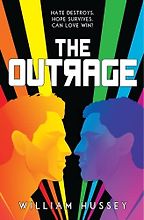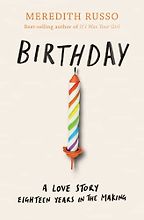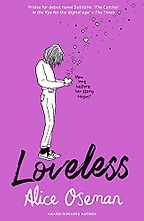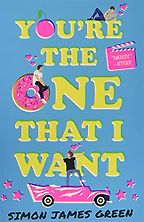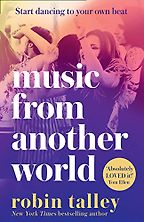Before we get to the books themselves, can you talk a bit about why you wanted to recommend the best LGBT novels for young adults?
As a librarian, one of the big things that we do is we go into schools and talk about lots of different kinds of books. I’m reading a lot of books all the time, and this is one topic that one of my customer schools asked for. Actually, they asked for LGBTQ+ reads for 11-14 year olds and in doing so really opened my eyes to realise that there is so much out there for LGBT readers or allies, or anybody that wants to know a little bit more about a different way of feeling about the world. I thought that was great, because there’s so much out there and it needs shouting about.
So these are great YA novels with an LGBT theme. Can you be more specific about what age of readers they are for?
I would put them all at age 14+, because there’s sexual content in there, there’s violence in some of them, and bad language. Generally, they’re dealing with quite mature themes that an older reader will appreciate more. The Outrage does come with a trigger warning at the beginning. The character in Loveless is a little bit older than the others because she’s just gone to university, but I don’t think it is inappropriate for somebody earlier in their teens if they want to read it. In Birthday they go from 13 to 18, but most of the other characters are around 16 years old. If I were talking about these books in schools I would only introduce them to readers age 14 and up.
Your first book pick is The Outrage by William Hussey. Why is this one of your top LGBT book recommendations for young adults?
This is one of those incredible books that once you’ve read it, you can’t not think about it afterwards. It is set in a dystopian future England, it’s very specifically England, where we’ve gone backwards in terms of LGBTQ+ rights. So it’s now illegal to be gay, along with lots of other things that differentiate people. It’s very patriarchal, it’s frowned upon to be non-white, to be of a different religion, to be anything other than what is the acceptable white, male, cisgender, middle-class stereotype. The book is all about teenagers, which is always the best vehicle for dystopian novels exposing society.
It’s brilliant, because the teenagers are trying to unpick that, they’re trying to make it better, they kind of make their own resistance. They discover all the stuff that they can no longer get hold of: banned films and banned books, some that we are very familiar with now and that are very popular. It’s a real insight into what life could be like or was like for the LGBTQ+ community in a time when it was illegal or very much socially prejudiced against being anything other than a heterosexual, cisgender person in society.
Some of the laws in this dystopia sound outlandish to people growing up now in places where gay rights are established, but there are lots of places where it is still illegal and dangerous to be LGBT. I think the author wants to make the point that those rights were fought for and we shouldn’t take any of them for granted.
Definitely. But it’s an incredible thriller as well. The appeal of it isn’t just the LGBTQ+ content, it’s very exciting. It’s 1984 meets The Handmaid’s Tale with a rainbow twist. It is an incredibly powerful story, one that you can’t not finish. Because with a dystopian novel, especially if you know 1984 you know that doesn’t end happily, so you’re driven by wanting to know what is going to happen. I’ve been privileged enough to host an author event with William Hussey, and what he knows and what he talks about with history and the rights of the LGBTQ+ community is incredible. So this is one of those books that really needs to be shouted about. It not only includes a gay couple—two boys—but we’ve got a trans character in there as well, who I think is incredibly well done. As soon as this character announces that they are in the wrong gender, that they want to be known as a different name, straight away the main character jumps on that and they go from being Albert to being Alice and the change of the pronouns. I think that sets a really good example.
I also think that the relationship between Albert/Alice and the protagonist is really well done, the complexity of not wanting to ruin the friendship, because you don’t know what’s going to happen to that friendship when you say that you’re trans. Another thing I thought was excellent is the climate of fear in that kind of fascist police state and what that does to family relationships. Parents who might otherwise just want their children to be themselves will instead want to keep them safe by insisting that they conform absolutely.
Let’s move on to your next pick of best LGBT novels for young adults, Birthday by Meredith Russo.
I picked Birthday because there are quite a few books out there for teenagers about the trans journey, coming out as trans and realising those feelings. Birthday is a brilliant example of that. It’s told over six birthdays, the 13th to the 18th birthday of two friends that have grown up together for their whole lives. We only see them on those six days in the book, we see them as they grow up, as they learn to understand the world around them and learn to understand themselves, and the different developments that their relationship has. What I really like about it is that we get to see the stages of not knowing who you are, being confused, being questioning, to the point of: ‘right, hang on a minute, I’m not a boy, I identify as a female, I want to be a girl,’ and that transition and how that affects the relationship. It’s enthralling as a story because you get really attached to the two characters. The story is set in America. Morgan is the character who transitions and it’s kind of based around the idea that Morgan’s father is very keen on male role models, female role models. He’s a football coach himself, so that’s adding all those extra anxieties into Morgan’s feelings, like you were saying about the families being involved in that. Eric is there as the sympathetic friend.
I also thought it is really well done. Readers are introduced early on to how Morgan feels and sympathise with how hard it all is, especially in a small town. There’s a period when Morgan decides to be a really macho boy, and the reader can see all along that that’s not going to end well. I agree that the technique of telling the story for just one day a year over a period of six formative years works extremely well.
I’ve read a lot around this book as well, and have spoken to lots of different people about it, and there are many people saying it’s a very authentic representation of that kind of friendship and relationship and that transition period. And it’s not overly sensationalised, it reads as a very compelling love story.
Let’s talk about your next pick of the best LGBT novels for young adults, Loveless by Alice Oseman.
This book won The Bookseller’s YA Book Prize in 2021. It is incredibly powerful. What I really enjoyed about this book was that it is all about asexuality and exploring a different kind of sexuality that we don’t hear about as much, we don’t often read about and we may not know anybody that is openly asexual or aromantic. This book introduced me to a different way of thinking and a different way of feeling about the world. It’s about a girl called Georgia who is just about to start university. She’s never had a relationship and she’s never had any sexual or romantic feelings, never had a crush on anybody before. She gets to university and thinks she’s going to find love and it’s going to be great.
Get the weekly Five Books newsletter
What happens is that she finds love in different ways. She finds it through friendship, she finds it in the wrong ways by trying to start a relationship with her male friend, which is happening for all the wrong reasons but she’s exploring that. I think that’s quite an authentic way of looking at it, as an example that must happen quite a lot for an asexual or aromantic person. She learns more by joining the LGBT society at university, she learns more words, she learns about different people, more options and ways that can describe her. So it’s all about promoting awareness, but I think to young readers and parents of young readers, and adult readers as well, it’s a beautiful story. It’s one of those books that I still feel like I’m in it, I can still imagine those characters, like I could walk past Georgia on the street. It feels very real, very visceral, very emotional. I think it’s brilliant.
All around us in books and films and song lyrics, so much has to do with romantic love and sexual attraction. There is all that social pressure and expectations from family who might think you’re just being overly picky if you choose never to be in that kind of relationship. I like how the story is about how there are other types of love and you can be fulfilled in lots of ways.
Yes, and both Birthday and this one are really good examples of Own Voices stories.
Your next pick of best LGBT novels for young adults is You’re the One That I Want by Simon James Green.
Simon James Green is a brilliant author for young adults. He’s got a new book coming out very soon, called Gay Club!, and it sounds incredible. But he also does middle grade and picture books. The middle grade verges on the same themes. You’re the One That I Want is my favourite one, it’s funny and we don’t get enough funny books for teenagers. It’s laugh-out-loud funny, it’s cringingly funny, but there are some very rude bits in there as well. It’s about a teenage boy who has never had a boyfriend before. It’s not a coming out story, that has happened previous to the story. It is about him trying to find that first relationship and find his place in the school community through the power of the musical production that is happening, which is Grease, which is where we get the title from. So it is brilliantly good fun, but you’ve also got some really quite complex teenage romances going on in there as well. Falling for the wrong guy, thinking you like somebody, them turning out to be disingenuous and just not the person that you thought they were. And I think that is really good representation in an LGBT romantic comedy novel, to have stories that aren’t just boy meets boy and they live happily ever after. It’s the complications. Love is love whatever person you are falling in love with, and I think this story is an incredible example of that. And it’s funny. Can I say that again? Because it is really funny.
It is, but it’s also serious in terms of the importance of communication, the fear of being humiliated and hurt, the exploration of romance. And I thought there is another good message, with theatre as the backdrop to the story, that to get good you have to put in a lot of work.
Definitely, you learn a lot about theatre, which I didn’t know. I love musicals, but I’ve never been in one so I feel like I learned a lot about that as well, which was good.
We’ve come to your final pick of the best LGBT novels for young adults, Music from Another World by Robin Talley.
Again, I thought this book was incredibly eye opening, because it’s got that historical slant on gay rights. It’s set in the 1970s and it’s told entirely through letters between two female characters who live in different parts of California, and their lives are completely and utterly different. Tammy is also writing letters in her diary to gay rights activist Harvey Milk. The story has a lot about what was happening at the time in terms of the politics, and how Harvey Milk was involved. Tammy writes these letters in her diary because she doesn’t feel like she can talk. She’s from a very conservative family which is openly against gay rights. Tammy is secretly gay herself and she wants to have those relationships, to live her full and true life.
Five Books interviews are expensive to produce. If you're enjoying this interview, please support us by donating a small amount.
At first she’s writing to Harvey Milk to get those feelings out there and put them down on paper, then she ends up as a pen pal with Sharon, who is in San Francisco and who is much more liberal. Sharon’s world is much more open and progressive and she’s involved a lot in punk music and protests. Her brother is openly gay. She is gay as well, as we find out by the end of the story, and the two girls bond over that. But what I really like about the book was learning the historical side of things, because I did not live through that time period, I was born in the late 1980s. And growing up and going through school I’ve taken it very much for granted that LGBT rights are human rights. But as we’ve spoken about already, that has not always been the case, and it was really interesting to see that from a 1970s female perspective. So what being a female in the 1970s was like, but also to be gay in the 1970s as a woman, with lots of layers of hardship. The music element is really empowering.
Am I right in thinking that the characters are particularly inspired by Patti Smith, her music and her lyrics? I remember reading that in a review.
Yes, the progressive punk rock side of things is something that Sharon as a character really tapped into, and it helped her fight for everything she was fighting for, helped give her that voice and that opportunity. Again, you’re looking at music from a historical point of view as well. I think it’s great. Robin Talley writes a lot of books with similar themes, we’ve had Lies We Tell Ourselves and more recently Pulp, and they both have that kind of historical twist to them, which makes modern day readers open their eyes a little bit more to the fight that has gone before us, and the fight that we still have now as well.
Sign up here for our newsletter featuring the best children’s
and young adult books, as recommended by authors, teachers, librarians and,
of course, kids.
Is there anything you would like to add about the books in conclusion?
Thank you for the opportunity to discuss these fantastic novels. They are just a small selection of the books available out there, there are so many more books and authors creating wonderful work. I could easily have talked about 55 books instead of five, and many more authors: Becky Albertalli, Juno Dawson, David Levithan, Lauren James, Leah Johnson, Rainbow Rowell to name a few. I hope I’ve helped to highlight the breadth and variety of young adult fiction for all readers. Fiction can be a great way to learn about the world, about ourselves and those around us. Books like these featuring teenage LGBTQ+ characters may be the springboard that helps a young person discover their true self, better understand a friend, or empathise with a situation around them.
Interview by Tuva Kahrs
March 31, 2022. Updated: February 20, 2025
Five Books aims to keep its book recommendations and interviews up to date. If you are the interviewee and would like to update your choice of books (or even just what you say about them) please email us at [email protected]
